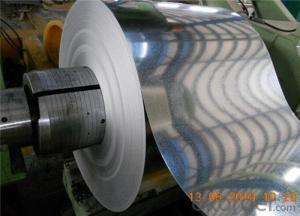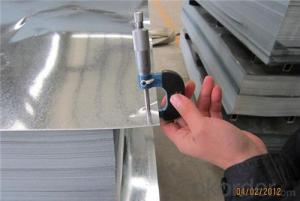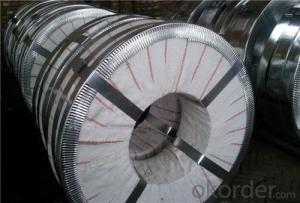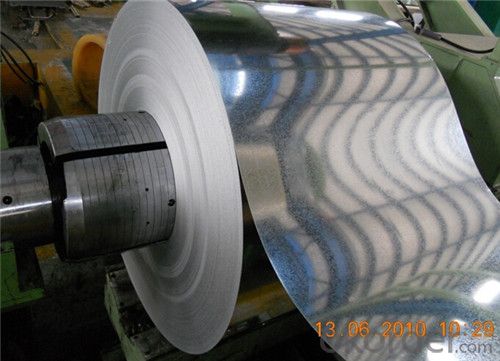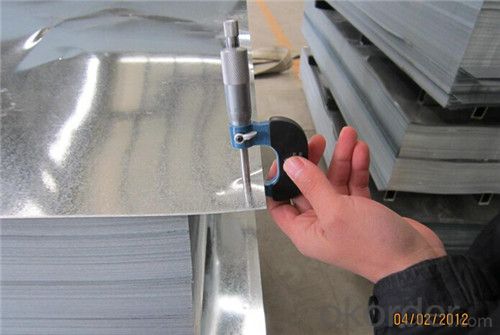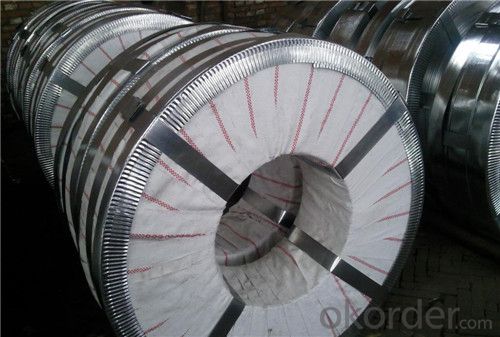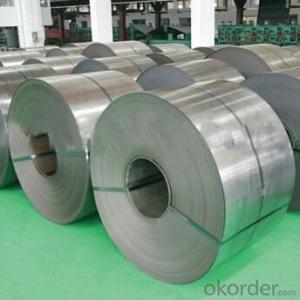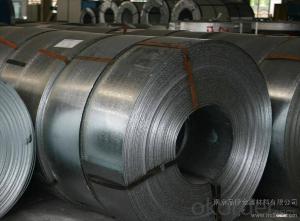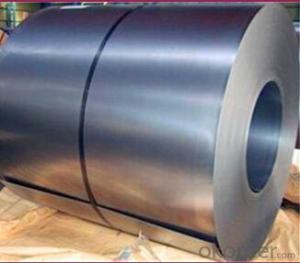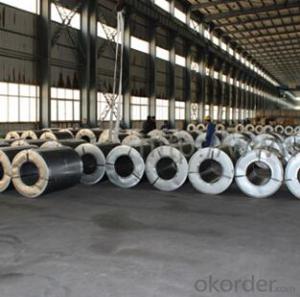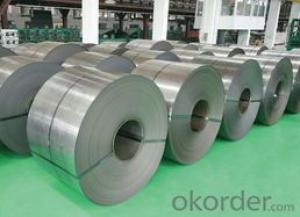Galvanized Cold Rolled Sheet Coil for building use
- Loading Port:
- Shanghai
- Payment Terms:
- TT OR LC
- Min Order Qty:
- 36 m.t.
- Supply Capability:
- 30000 m.t./month
OKorder Service Pledge
OKorder Financial Service
You Might Also Like
Brief Introduction
1. Prepainted Galvanized Steel Coil is coated with organic layer, which provides higher anti-corrosion property and a longer lifespan than that of galvanized steel sheets.
2. The base metal for Prepainted Galvanized Steel Coil is HDGI Steel. The finish coats of Prepainted Galvanized Steel Coil can be classified into groups as follows: polyester, silicon modified polyesters, polyvinylidene fluoride, high-durability polyester, etc.
3. The production process has evolved from one-coating-and-one-baking to double-coating-and-double-baking, and even three-coating-and-three-baking.
4. The color of the Prepainted Galvanized Steel Coil has a very wide selection, like orange, cream-colored, dark sky blue, sea blue, bright red, brick red, ivory white, porcelain blue, etc.
5. The Prepainted Galvanized Steel Coil can also be classified into groups by their surface textures, namely regular prepainted sheets, embossed sheets and printed sheets.
Specification
1. Thickness: 0.3-0.8mm
2. Width: 914-1250mm
3. Inner Diameter: 508mm
4. Weight of Steel Coil: 3-15MT
5. Available Dipped Layer: 50-150g/m2
6. Surface Texture: Normal Coated
7. Type of coating structure: 2/1 Coat the top surface of the steel sheet twice, coat the bottom surface once, and bake the sheet twice.
8. Front Side Paint Thickness: 15-25μm (bottom paint+top paint)
9. Back Side Paint Thickness: 5-10μm
Mechanical Properties
1. Mechanical properties of base metals
Grade | Tensile Test | ||
Yield Strength MPa | Tensile Strength MPa | Elongation A80mm % ≥ | |
DX51D+Z | 140-350 | 270-500 | 22 |
DX52D+Z | 140-300 | 270-420 | 26 |
DX53D+Z | 140-260 | 270-380 | 30 |
2. Common performance of front coating
(1). Thickness: ≥20μm
(2). Pencil Hardness: 2H
(3). 60° specular glossiness of coating: >60
(4). 180°bend: ≤3T
(5). Impact: ≥9J
(6). Salt Fog Resistant: ≥500h
(7). Color difference:<3δe< p="">
- Q: How does the thickness of a steel coil affect its applications?
- The thickness of a steel coil has a significant impact on its applications. The thickness determines the strength, durability, and versatility of the steel, making it suitable for various uses across different industries. In applications where strength is crucial, such as the construction industry, thicker steel coils are preferred. Thicker coils provide higher structural integrity and load-bearing capacity, which is essential in buildings, bridges, and infrastructure projects. Thicker steel coils also offer better resistance to bending, warping, and other forms of deformation, making them ideal for heavy-duty applications. The thickness of a steel coil also affects its durability. Thicker coils have a higher resistance to wear, corrosion, and damage, making them suitable for harsh environments or applications that involve constant friction or exposure to elements. For example, thicker steel coils are commonly used in manufacturing heavy machinery, automotive parts, and mining equipment, where durability is paramount. Furthermore, the thickness of a steel coil determines its versatility and adaptability. Thinner coils can be easily formed into different shapes and sizes, making them suitable for applications that require intricate designs or tight tolerances. Industries such as automotive, aerospace, and consumer electronics often rely on thinner steel coils for their lightweight and flexible nature. On the other hand, thicker steel coils may limit the range of applications due to their weight and reduced flexibility. They are more suitable for applications that prioritize strength and durability over versatility. These applications include structural components, large-scale machinery, and industrial equipment. In summary, the thickness of a steel coil plays a crucial role in determining its applications. Thicker coils offer increased strength, durability, and resistance, making them ideal for heavy-duty applications in construction and manufacturing industries. Thinner coils, on the other hand, provide versatility and adaptability, making them suitable for applications that require intricate designs or lightweight properties.
- Q: I'm a hiker and cook on a camp fire with a canteen cup. So which would be a better material for cooking on a campfire with, aluminum or stainless steel?
- Direct fire will kind of ruin stainless steel. I've screwed up several stainless steel pans cooking directly on a campfire. I have to agree with wildflower the best route by far in a small cast iron pan. They are pretty heavy though.
- Q: i have a guitar with three nylon three steel strings. Am i able to replace the nylons with steel strings?
- Be careful - if the guitar is strictly a classical guitar, then it is made to handle nylon strings only. If you put steel strings on a classical nylon-string guitar, you can bend the neck pretty bad due to the increased tension of the steel strings. Research your particular guitar in question and see if it is in fact a nylon-only classical guitar or not.
- Q: Are steel or graphite clubs better?
- If its for your bf, i would buy steel. Most guys prefer steel because it is more accurate and it think every guy on the pga tour uses steel shafted irons. Steel also usually costs less, which helps. Neither one is better, its just a matter of personal preference.
- Q: What are the dimensions of steel coils used in the agricultural structure industry?
- The dimensions of steel coils used in the agricultural structure industry can vary depending on the specific application and requirements. However, common dimensions range from 0.5mm to 3mm in thickness and 600mm to 1500mm in width.
- Q: for a roof spanning 14.4m x 8.4m on a residential house, is it better to use timber trusses or steel trusses? the priorities are; ease of construction, price, insulation (want to keep heat out, i am in a tropical country), durability, flexibility, minimal load on foundations.please help. thank you :-)
- How about another option - Steel Re-inforced Concrete Beams. Beam planks would span 8.4 metres but to keep the cost down have an I beam support at 4.2m. Concrete is great. It goes on quick, is sound proof, (very nice when it rains or for road traffic), can have gravel laid on top to act as a heat sink for winter sun and can be covered with normal roof steel if you want to hide it. Its also rust and borer free. While you would need good supports for the front and back, although with an I beam you can have a floating front, it is not much more than what is required for a wooden top. Design it right and your roof could be a future floor for the next addition.
- Q: How are steel coils used in the production of containers?
- Steel coils are used in the production of containers as they are the primary material for manufacturing container bodies. These coils are shaped and welded into the desired container shape, providing strength and durability to the final product.
- Q: If i get a samurai sword made of carbon steel, what is the hardest thing i can hit before it breaks? Or will it not break?
- If you can get it, and it is not in a museum or owned by a wealthy collector it is probably junk. a realsamuari ( warrior) sword probably took a year or more to make, 6 months or so to sharpen and was tempered by dipping in the blood of a peasant. It might have been marked by the number of human bodies it could cut through in one stroke ,1 was a minimum by all accounts they were the finest steel weapons ever made the curved thing in a knife shop is a cheap knock off
- Q: I am looking for steel. I need a lot.
- ..mm where are you located? .. how much steel is a lot of steel to you? .. whats it worth to you? .. do ya want it from salvage sorce, or from milled sorces? There is a lot of it around, even places that would pay ya to haul it off..
- Q: Hi, I need to know why stainless steel is rust proof please tell me its for my science project. :)
- Why doesn't stainless steel rust? Nancy Avery, New London, Conn. Metallurgical engineer Michael L. Free of the University of Utah offers this explanation: Stainless steel remains stainless, or does not rust, because of the interaction between its alloying elements and the environment. Stainless steel contains iron, chromium, manganese, silicon, carbon and, in many cases, significant amounts of nickel and molybdenum. These elements react with oxygen from water and air to form a very thin, stable film that consists of such corrosion products as metal oxides and hydroxides.
Send your message to us
Galvanized Cold Rolled Sheet Coil for building use
- Loading Port:
- Shanghai
- Payment Terms:
- TT OR LC
- Min Order Qty:
- 36 m.t.
- Supply Capability:
- 30000 m.t./month
OKorder Service Pledge
OKorder Financial Service
Similar products
Hot products
Hot Searches
Related keywords
